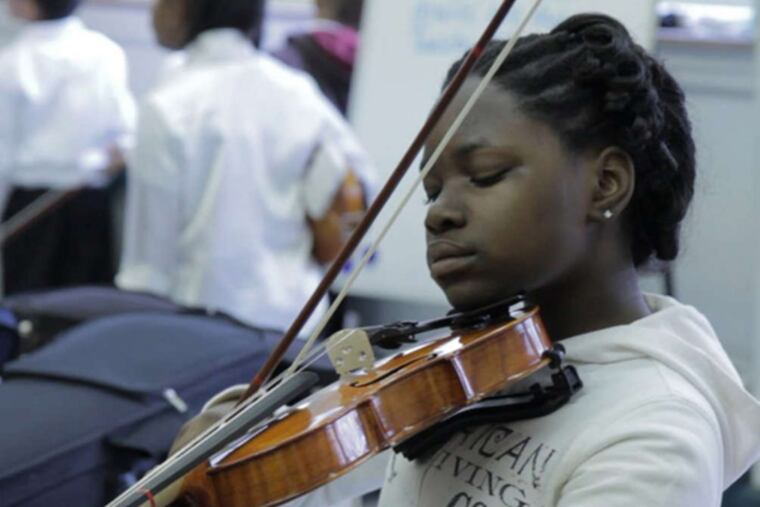'Crescendo!' hits just the high notes
The narrative arc of Crescendo! The Power of Music hews to a common form - it develops characters, makes us care about them, finds crises, and ties things up neatly at the end of the 85-minute film. By the reckoning of every voice we hear, Play On, Philly!, the intensive after-school program at St. Francis de Sales School in West Philadelphia, is nothing less than a miracle.

The narrative arc of Crescendo! The Power of Music hews to a common form - it develops characters, makes us care about them, finds crises, and ties things up neatly at the end of the 85-minute film. By the reckoning of every voice we hear, Play On, Philly!, the intensive after-school program at St. Francis de Sales School in West Philadelphia, is nothing less than a miracle.
It would be wonderful to feel more sure about that. The most resonant cry classical music has mustered against the roar of commercial culture is the claim that it can change the world.
"From the moment a child picks up an instrument, she is no longer poor," says José Antonio Abreu, founder of the El Sistema music program on which Play On, Philly! is based. "I know that if we can keep this program in their lives, we can literally save their lives," says Curtis Institute of Music graduate Stanford Thompson, winsome founder of the Philadelphia program at the center of the film, debuting this week at the Ritz and Prince theaters as part of the Philadelphia Film Festival.
These are big claims, supported more by evangelizing than specific stories. Hearing the furious sounds of Shostakovich, we see the source is not the expected august corps of silver-haired white men, but a sea of groovy youth, just a few of the million children in Venezuela's El Sistema programs. The action then cuts to the streets of West Philly, where scrap is being collected by aimless young men, a mural says, "Stop the violence," and Thompson, then 23, is saying that if Venezuela can do it, so should Philadelphia.
The shots are proxies for the issues filmmakers Elizabeth Kling and Jamie Bernstein suggest but don't plumb as fully as they might. They did find compelling characters from Play On, Philly! and the Harmony Program in Harlem - terrific teachers, students, and parents. We are shown the schoolwork versus practice-time tussle. But how is this different from the demands of any community music school? Does playing classical music carry a stigma within the African American community? Are Play On, Philly! students facing and overcoming adversity? The head of the St. Francis School says there have been shootings - but who? Where? We are told of absentee parents - but is this really an unusual condition today?
Thompson tells his players: "I refuse to put you guys on any stage anywhere in front of an audience that will sit there and say, 'Oh, that's so cute, they're little black kids from West Philadelphia, playing classical music.' " But rather than filling out this idea with context from outside voices, the film spends a lot of time developing characters with less interesting stories. When Raven, a central character, gets seated farther back in the violin section because she is becoming too cocky, the crisis seems trite next to the mention of shootings.
Crescendo! uses some of the same conventions as American Promise, the widely seen film that follows two boys from the exclusive Dalton School in New York who find themselves at the fraught intersection of race, education, and class. That film had the benefit of following its subjects for 13 years; Play On, Philly! has been in operation since only 2011.
Still, American Promise set off an important discussion because so many of the issues it raises are unresolved. In a documentary, the well-placed question mark often speaks louder than the exclamation point, no matter how well-intentioned.
Crescendo! The Power of Music **1/2 (Out of four stars)
Directed by Jamie Bernstein.
Running time: 85 minutes.
Parent's guide: Not rated.
Playing at: Ritz Bourse, 3 p.m. Monday; Prince Music Theater, 3:15 Saturday.EndText
215-854-5611